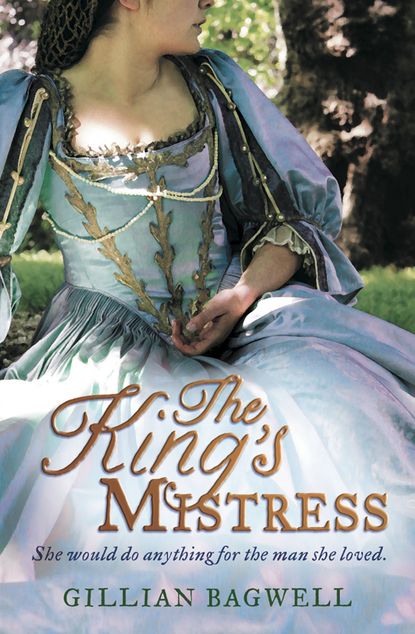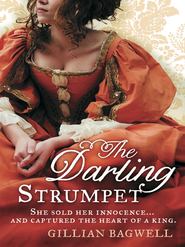По всем вопросам обращайтесь на: info@litportal.ru
(©) 2003-2025.
✖
The King’s Mistress
Настройки чтения
Размер шрифта
Высота строк
Поля
The king, only six miles away, and still in danger. It was like something out of a play, Jane thought.
“Oh, no,” she whispered. “What will he do?”
The firelight flickered orange on John’s face, and it seemed to Jane there were lines around his eyes that had not been there only days earlier. His voice was hoarse when he spoke again.
“Jane, I am loath to say what I am about to because I would not put you in danger, but I can see no other way.”
Jane stared at him. What could he mean?
“The king must ride with you to Abbots Leigh. Not Wilmot, but the king himself.”
The shock was so great that Jane found she could say nothing.
“He’s already disguised himself, Wilmot says, cut his hair and changed clothes with a poor woodsman so that none would know him.”
Jane tried to picture the dashing young king who had rallied his troops at Worcester, grimy and unrecognisable.
“We can clothe him in better apparel, and hope that he’ll pass as your serving man. But, Jane, this is far more dangerous than riding with Lord Wilmot.”
“I must help him if I can.”
John stared into the fire, and shivered despite its warmth. “When the king’s friends parted from him at Whiteladies,” he said, “they begged him not to tell them his plans so they could not be forced to reveal them if they were put to torture. Jane, if you were to be taken … The danger is great.”
Jane swallowed. She was very much afraid at the thought of what might happen to her. But if she did not help the king to escape, surely he would be found and captured soon.
“I’ll do it.”
“Someone else must go with you.”
“Henry.” Jane had always felt that in the company of her cousin Henry she could come to no harm, and she felt the more so now that he was a soldier. She recalled the steely determination in his eyes when he had set off with John the few days earlier that now seemed so long ago, and his bitter disappointment when they had returned in confusion, having left too late to join the battle.
“Yes. Henry would go, and I’ll have less fear knowing that he’s with you.”
“But when shall we go? Surely soldiers will be searching the houses hereabout and are like to find the king?”
“Moseley has a priest hole, so the king is well hidden. But still he must fly soon.”
Jane had been shown a priest hole once, in the house of a Catholic friend. It was a little space, not more than four feet square and three feet high, just big enough to hide a man or forbidden articles such as crucifixes, the entry hatch concealed beneath a close stool in the floor of a closet. It had made her skin creep to think of climbing down into it, with no air and no light save for a candle, and her heart went out to the young king.
“Wilmot will send tomorrow to know if you’ll undertake the journey. Think it over.”
“I don’t have to think,” Jane said, pushing her fears aside. “Nothing could stop me.”
The next day after noontime dinner, John stopped Jane as she was heading upstairs to her room.
“Henry’s in the orchard. Come join us for a little chat.”
She grabbed a shawl and hurried out with him, relieved that Withy and her nose for secrets were nowhere to be seen. Henry was swinging by his arms from the branch of a great apple tree, and drew himself up higher before he dropped to the ground, dusting off his hands on the knees of his breeches. He was almost thirty, but there was something very boyish about the way his whole face was lit at the prospect of adventure, Jane thought.
“I’ll ride to Moseley again tonight,” John said, “and bring Wilmot back so we can make our final preparations, but let’s consult between us now.” He turned to Henry. “Jane’s pass is for her and a manservant, no more. I’m concerned that if I go back to Colonel Stone and ask to add someone else, it will draw attention we’d better avoid.”
“Agreed,” Henry said. “I’ll chance it. If we’re stopped and the king is recognised, the lack of a pass will be the least of our worries.” He grinned at Jane, eyes shining. “Didn’t think when you woke up a few days ago that we’d be saving the king’s neck, did you?”
“No,” Jane smiled.
“Are you sure, Jane?” John asked. “If you’re having second thoughts, better to voice them now.”
“I’m having no second thoughts. And if I were, I’d go through with it anyway. For what other way is as sure to get the king out of danger?”
“Spoken like a true soldier.” Henry tweaked a curl that strayed from Jane’s cap, the same as he had done since she was a little girl and he a dashing older boy. “But it’s as well I’ll be with you, to protect you from the king as much as for anything else.”
“Why, what a thing to say!” Jane cried in astonishment. “What may you mean by that?”
“Only that he’s a man like any other, and used to having his way.”
“Careful, Henry,” John warned.
“John, if she’s to travel with him, she should know to be on her guard.” John shrugged in acquiescence, and Henry continued. “He’s already got a bastard son by a wench on Jersey, and there are whispers that he got at least one child on the daughter of the governor there, too.”
Jane felt a little shock at such licentiousness, but she was more annoyed at the sight of Henry, clearly expecting her to be outraged.
“Brisk work for a lad of twenty-one,” she said coolly. “But I’m sure His Majesty will have more on his mind than attempting to debauch me.”
She smiled inwardly to see that Henry looked disappointed at her lack of reaction.
“It’s too cold to tarry here,” she said. “We’ll talk more tonight. I’m going in.”
HENRY WAITED WITH JANE IN THE DARKENED KITCHEN THAT NIGHT. John had a book of maps that had been prepared for Royalist officers, and Henry studied it by the lantern light.
“An exceeding useful thing to have,” he said. “The maps will save us asking our way. The less attention we bring to ourselves the better.”
Jane paced, going to the window to peer out into the blackness. The pale curved crescent of the moon had risen into view before they heard the clatter of horses’ hooves. A rush of cold air gusted through the kitchen as John came through the heavy wooden door, followed by a stocky figure wrapped in a bulky cloak, and Jane shivered as the reality of what she was planning to undertake hit her.
“My lord, may I present my sister Jane? You know my cousin Henry Lascelles, I believe.”
“Your servant, Mistress. A pleasure to see you, Lascelles.”
As Wilmot pulled off his hat and bowed to her, Jane saw that he was a big man with a spreading paunch, near on forty years old, and nothing like the dashing hero of her imagination. But still he looked the part of a soldier, and Jane knew from John’s service under him that he was a capable and shrewd commander. She brought warm drink to the table and sat down with the men. Wilmot’s buff coat was splattered with mud, the collar of his shirt was grimy, and his unshaven face was stubbled with grey, and Jane remembered that like the king, he had been on the run from Cromwell’s men for five long days.
“Henry will ride with my sister and—your master,” John said, his voice low.
Wilmot nodded his understanding.
“An extra man will not go amiss in case of danger,” John added. “And you and I may be of help, too, my lord. We can give out that we go to visit Clement Fisher at Packington. The way lies in the same direction the others will travel, and we can keep in sight at least through the morning.”
“Well bethought,” Wilmot nodded. “The greatest danger probably lies closest to here, so the more men to hand the better. And I shall be glad to see Fisher again.”
“The situation has fallen out well for our purpose,” John said. “I had planned to send the son of one of our tenant farmers to accompany Jane, and it is such a man your master must feign to be. We’ll provide suitable clothes and instruct him in what he needs to know.”






